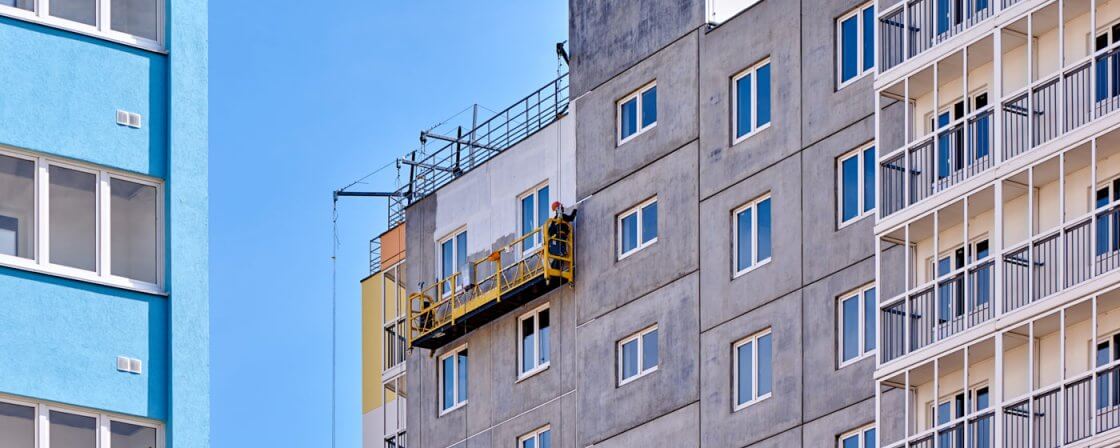Which houses are affected by the reconstruction?
Houses, like other properties, age and one day there will come a time when they require renovation. Most of the historic buildings in the centre of Czech cities have already undergone reconstruction.
These buildings were very neglected and often dilapidated, mainly because they belonged to “everyone”. The problem today may be more the prefabricated houses that have been built in large numbers since the 1960s. Some of them had an estimated lifespan of only thirty to fifty years, i.e. today they are at the limit of their declared lifespan. They are then often inhabited by a large number of diverse people who find it difficult to find common ground on reconstruction priorities.
It is also true that the prices of apartment buildings and individual apartments after reconstruction are higher than those before reconstruction. Therefore, the best option is to get an apartment in a house that has already been renovated and even managed to pay off the renovation. This means that the property is not legally encumbered by a mortgage, which can mean a big saving on fees.
So what is the legal situation with this decision? It always depends on the statutes, whether it is a housing association or a building managed by a community of owners. Ordinary matters are usually decided by majority vote. That is to say, a majority of those present at the relevant meeting. A quorum may be present if at least 50 per cent of those entitled to vote are present. Proxies of absent persons shall be counted. Thus, the consent of more than a quarter of all the occupants of the house is actually sufficient for ordinary decisions.
In a cooperative, everyone has one vote. In a community of owners, the weight of the vote is calculated according to the proportion of the common parts of the house. Thus, whoever has a larger apartment or owns several has more votes. This is a problem especially in houses where over half of the flats are owned by the developer or some other individual.
Approval of reconstruction
In an HOA, the approval of a renovation is decided by the unit owners at a meeting, where a qualified majority will often be needed and not just a majority of those present as in the case of approving ordinary matters. It will depend on what the encroachment on the common areas is and whether a special majority is provided for in the bylaws. If the issue of whether and how to do the renovation is resolved in the HOA, there is necessarily a decision on who will pay for it. This is again decided by the unit owners at a meeting.
Usually it is a single decision, where the committee also presents the results of a “tender” with specific quotations. Such a practice is appropriate, but unlike state and contributory organisations, a tender is not required by law here.
Tip for article
How to sell or buy an apartment building? What are the specifics of the purchase contract and what to watch out for? Find out in our article.
Methods of financing
One option is to fund the work from the so-called “repair fund“. This is a kind of “package of money” that is specifically for repairs and renovation of the house. The owners put money into it as part of their contributions to the management of the house. This includes both payments for the day-to-day running of the house (insurance, hallway lighting, lift operation, waste collection) and payments to the ‘repair fund’.
Contributions to this fund can amount to a significant amount for those HOAs that save for more substantial repairs. Contributions can thus have both a positive balance in the case of a particular owner (e.g. the owner has “saved” a hundred thousand to the repair fund) and a negative balance (the owner owes the SVJ for the reimbursement of these contributions). This is something to watch out for when buying a property. It is extremely important for both the seller and the buyer to come to an agreement regarding the settlement of the house management contributions.
It is best to do this directly in the purchase contract. The HOA itself will not be of much help in this, because according to the new Civil Code it is not obliged to settle the contributions in any way when selling the flat.
If the seller has saved a considerable amount of money in a “repair fund”, this is nothing more than funds for the future appreciation of the apartment, which the seller can sell together with the apartment to the buyer.
Another option is to finance the renovation with a special loan, usually secured by a lien. However, this is very problematic in the case of an owners’ association, as the pledge can be blocked by individual dissatisfied owners.
In a housing association, the situation is somewhat simpler; the house is often owned entirely by the association, which therefore also owns all the flats. At a membership meeting, a majority of those present must vote on a new roof or lift. At least half of all members of the cooperative must be present for a quorum to be present.
If this is not possible, an alternative meeting can be called where the quorum mentioned above does not apply. Housing associations sometimes convene a substitute meeting immediately, perhaps half an hour after the regular meeting. They send out an invitation to this potential replacement meeting at the same time as the regular invitation. However, this is contrary to the law and such a convocation is not in order. The meeting, including its resolution, may be challenged in court for invalidity.
When everything is “voted”, the condo association implements its decision, notwithstanding the overvoted members. The most they can defend themselves with is a lawsuit in court. They can challenge the decision of the members’ meeting or use a members’ action to claim damages against a member of the cooperative body if, for example, he or she exceeded the approved budget or otherwise did not behave as a good steward and caused damage to the cooperative.
This article was prepared for the Lidove noviny series “Law & Housing”. See also other articles from the series:
- What to watch out for when buying a property
- How to get a mortgage
- What to check before buying a property
- Who pays the property transfer tax and how?
- What should be included in a property purchase contract
- The most common mistakes when drafting a proposal to the Land Registry
- Buying a property from a developer
- Keeping the purchase price when buying a property
- The difference between a condominium and a freehold
- What is an annuity?
- How to properly gift a property
- What is the purpose of an easement or servitude?
- Making a will and settling an estate
- What is a collation
- What shouldn’t be missing in a lease agreement
- When rent increases can be made
- Termination of the lease
- Agreement to end the tenancy
- How to draw up a work contract with a tradesman
- Hidden defects and cancellation of a work contract
- When do you need planning permission to renovate a property?
- Home Rules
- What does serving on a condominium board entail?
- Why not underestimate the bylaws in a condominium
- Common areas in a block of flats
- What is involved in refurbishing a block of flats
- Can a condominium or housing association go into debt?
- How to renovate a house or cottage
- What to watch out for when dealing with a construction “company”?
- Building a house on a “green field”
- How to remove land from the agricultural fund
Are you solving a similar problem?
Lawyer for HOA and housing cooperatives
We will provide you with a lawyer for HOA or housing cooperative for 6 or 12 months. He or she will be available at any time to represent you in court or with the authorities and help you with any legal issue. All this for a price you know in advance and the option to pay after the service is completed.
I want you to help
- When you order, you know what you will get and how much it will cost.
- We handle everything online or in person at one of our 6 offices.
- We handle 8 out of 10 requests within 2 working days.
- We have specialists for every field of law.




